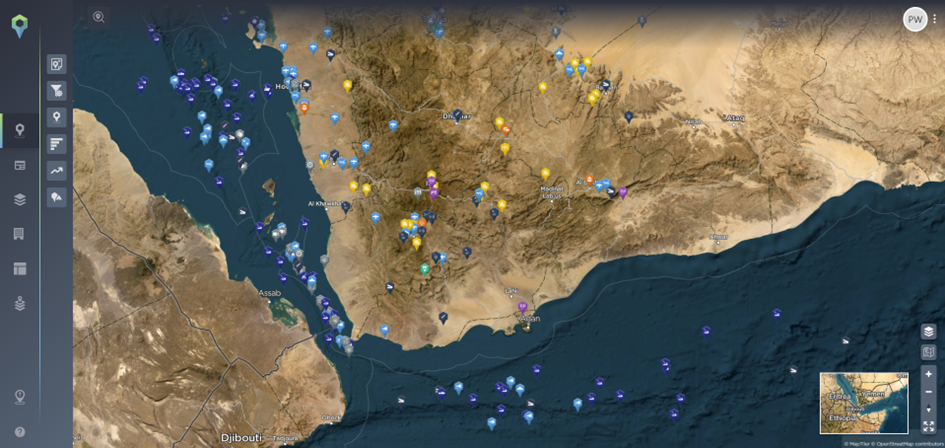Iran attacks Israel: What comes next?
For the first time in their history of conflict, Iran has directly attacked Israel. What has led to this moment? And, amid global fears over escalation, will Israel attack Iran in response?
On Saturday 13th April, Iran launched a multitude of projectiles at Israel, bringing their long-standing shadow war to direct conflict. Iran fired a total of around 320 projectiles from their territory, which included 170 drones, 30 cruise missiles and 120 ballistic missiles. Israel has claimed 99% of those were intercepted with none of the drones making it to Israeli airspace, and 25 of the 30 cruise missiles also intercepted. The ballistic missiles were largely intercepted by Israel air defences but a child was injured as a result of falling debris. The Nevatim airbase appears to have been specifically targeted due to its use in recent airstrikes in Syria and its runway suffered reparable damage after being hit by four missiles. US sources have since claimed around 50% of the ballistic missiles failed to launch or crashed before reaching their target.
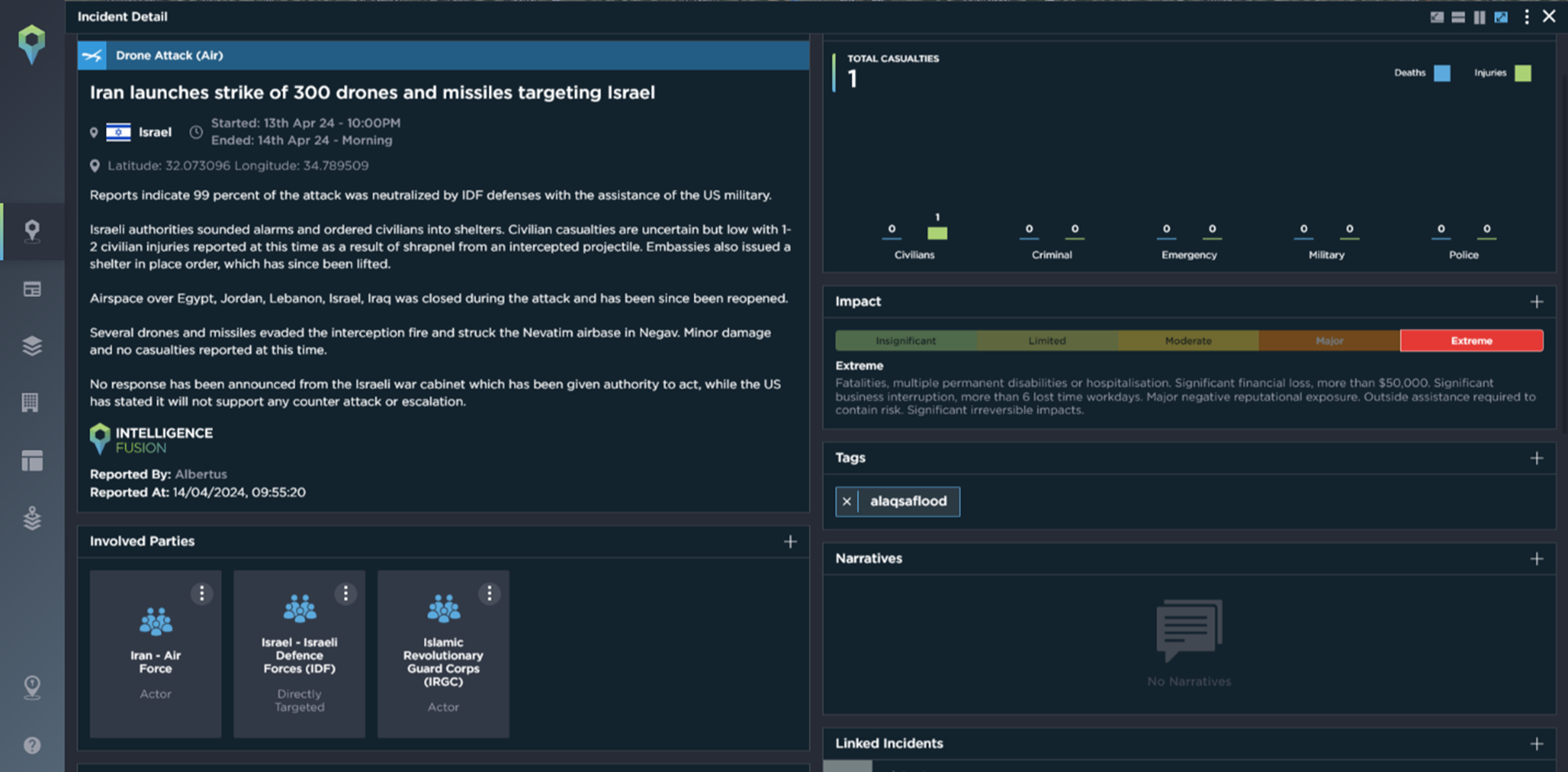
How Iran's attack on Israel was reported on the Intelligence Fusion platform [image source: Intelligence Fusion]
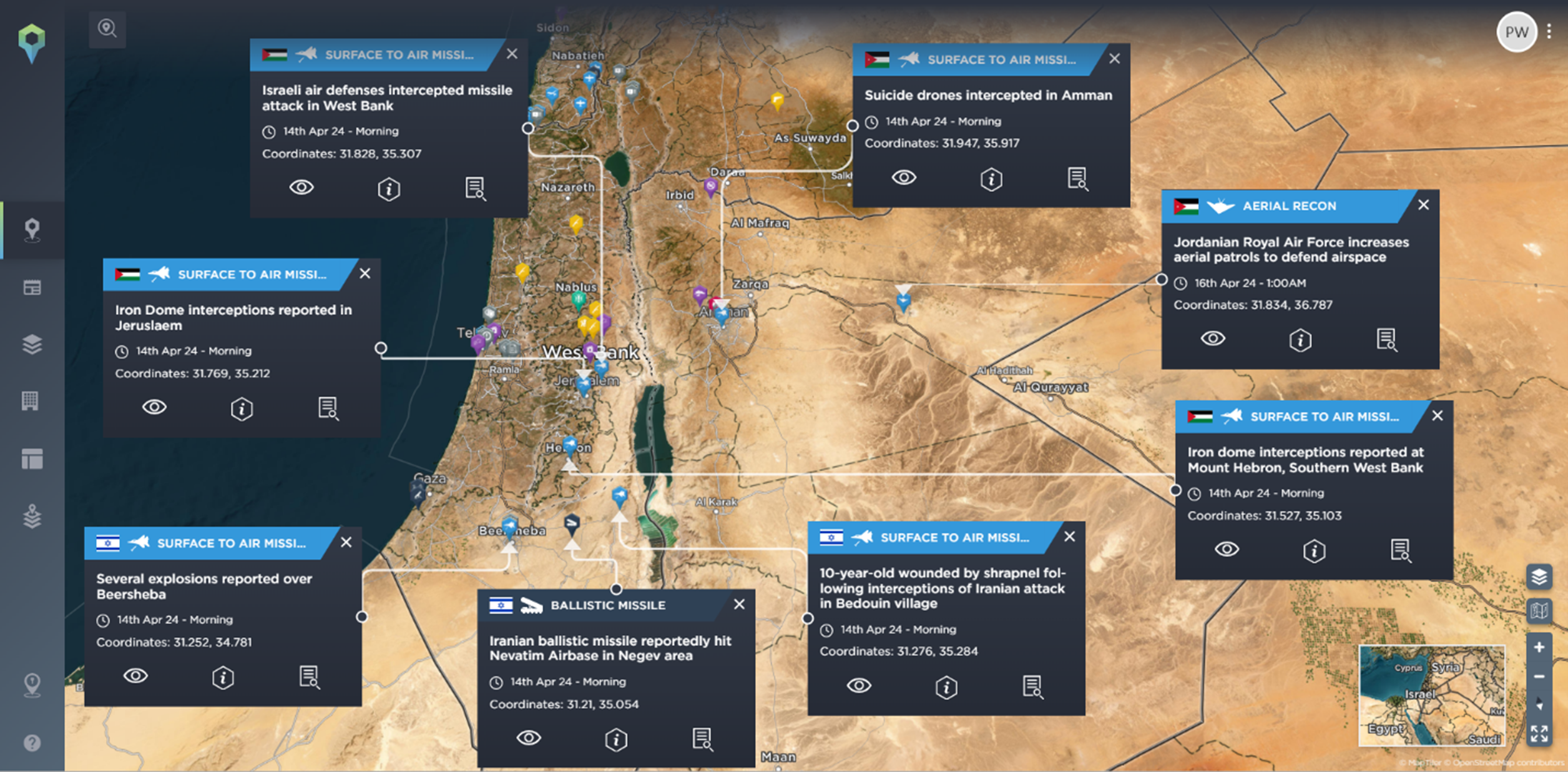
How Iran's attack on Israel was reported on the Intelligence Fusion platform [image source: Intelligence Fusion]
The United States, United Kingdom and France all participated in the interceptions of projectiles outside of Israel. Other regional actors also had varying degrees of involvement in the defence. Notably, Jordan participated in interceptions over its territory. It is reported that Egypt had readied its forces to participate, and, despite official protestations, it also appears that Saudi Arabia participated in downing Houthi projectiles, which may have been limited to intelligence sharing. The UAE also shared intelligence but like Saudi Arabia denied use of their airspace.
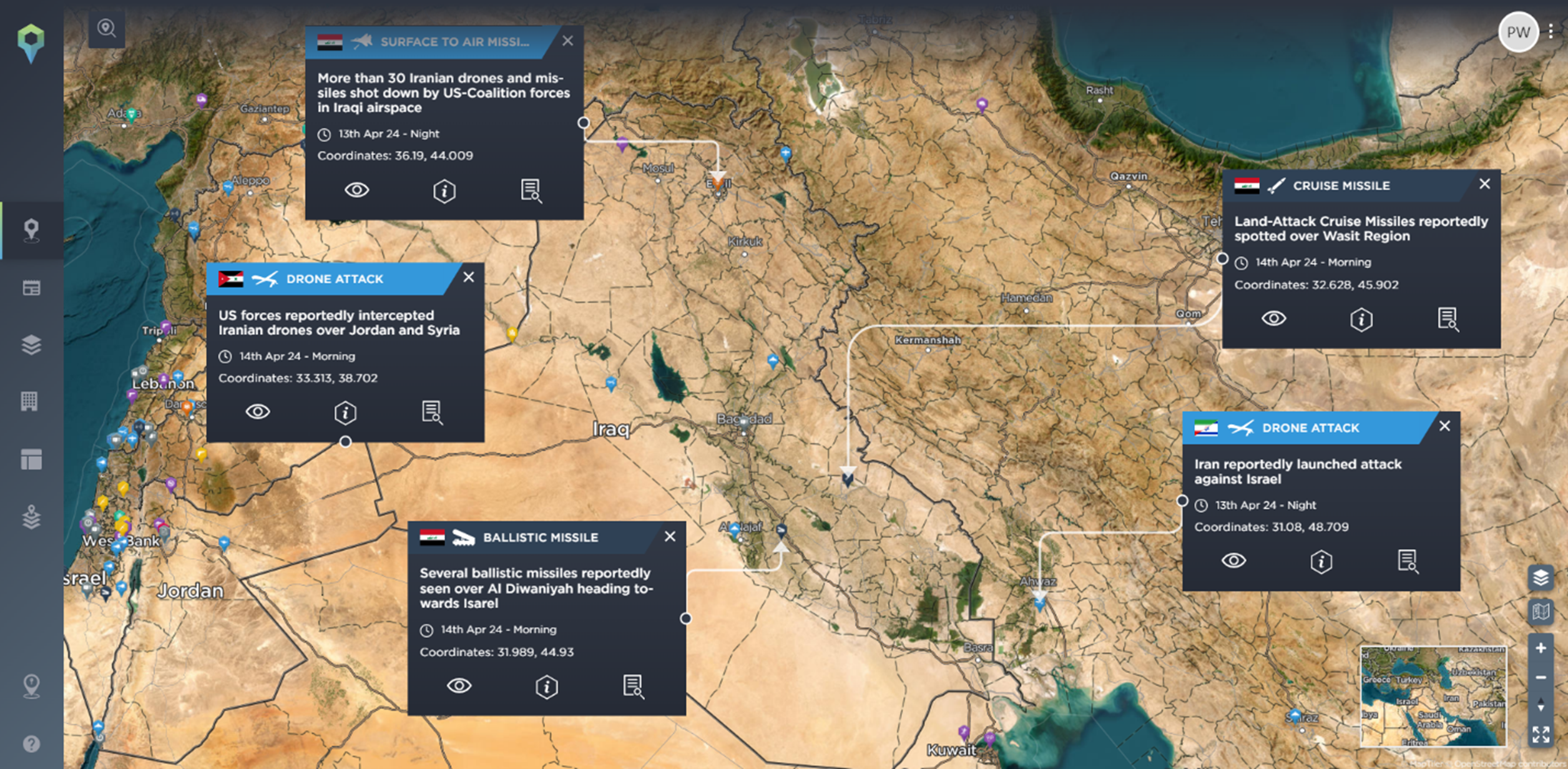
Countries including the US, UK and France all participated in the interceptions of missiles and drones, while other regional actors also had some involvement [image source: Intelligence Fusion]
The Iranian attack was the country’s attempt to reestablish deterrence after Israel bombed their embassy in Damascus on the 1st April. The attack killed a number of IRGC members, including Quds Force Brigadier General Mohammad Reza Zahedi, who was responsible for supplying Hezbollah and was reportedly a member of that group’s Shura Council. Iran vowed to respond to the attack, but the attack on Israel was a significant gamble for Ayatollah Ali Khamenei who has normally favoured patience and relied on its allies and proxies in the region to carry out attacks rather than Iranian troops themselves. Iran has sought to draw a line under any further attacks, but it seems to have had the opposite effect. The attacks have shifted international attention away from Gaza, where longtime Israeli allies have recently been publicly criticising its conduct, to one of broad western support for Israel and condemnation of Iran with fears its attack will result in a wide, destructive regional conflict. Any hope of an imminent ceasefire deal appears to be dead in the water.
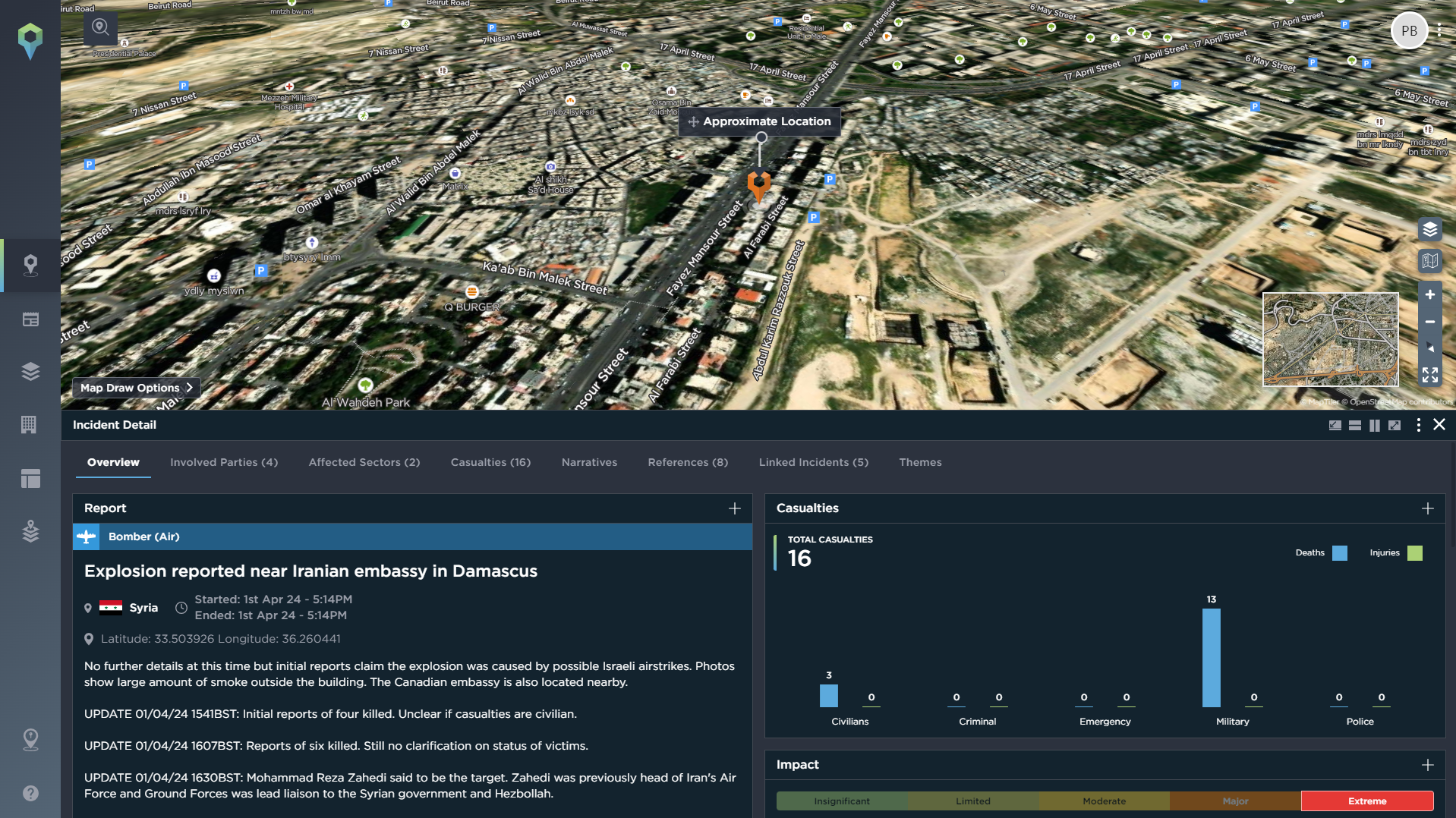
Iran's attack on Israel came in response to the bombing of their embassy in Damascus, Syria on 1st April [image source: Intelligence Fusion]
Almost immediately Israel announced it would respond, despite public protestations from many world leaders. President Biden has told Prime Minister Netanyahu that the US will not support any Israeli counterattack and told Netanyahu to treat the interceptions as a victory. Other states have also called for restraint, with the UK, France and Russia all warning against escalation. However, Israeli Minister of Defense Yoav Gallant has told his counterpart Lloyd Austin that Israel has no choice but to respond to the attacks and reportedly told him that Israel will not accept direct attacks on its territory every time it carries out airstrikes in Syria.
While the attack was telegraphed extensively before, the scale and direct nature have resulted in speculation that Israel will not seek to limit their response. Before the attacks, US officials briefed that Israel would target Iranian allies, most probably Hezbollah, in return. An Israeli response is now expected to be “forceful” which has increased fears of a direct attack on Iran itself. While the attacks did not cause significant material damage or loss of life, the psychological impact of a direct attack from what is regarded as an existential threat coupled with widely shared images of interceptor explosions above the Knesset and the Temple Mount in Jerusalem must be taken into consideration.
Israel has reportedly delayed its awaited assault on the last remaining section of Gaza, Rafah, and switched focus to Iran. Israel’s war cabinet, consisting of Prime Minister Benjamin Netanyahu, his defence minister, Yoav Gallant, and opposition leader and former IDF Chief of Staff Benny Gantz, is reportedly split on their exact response. Gantz and his ally Gadi Eisenkot, who has observer status, had wanted to respond immediately to Iran as their attack was underway. This was opposed by Netanyahu, Gallant and IDF Chief Herzi Halevi who expressed concern over simultaneous action. Some in the War Cabinet have pushed for swift, decisive action, while others have stressed patience, suggesting that waiting might draw further international support or create more strategic advantages. Foreign Minister Katz has written to 32 countries urging them to sanction Iran’s missile program and there are calls for western nations to relist the IRGC as a terrorist group.
While the US has publicly made clear that it will not participate in any Israeli response, Israeli media have reported that the US had not sought to veto any Israeli action but rather require advance warning, which was not given before the Damascus strike.
Direct strikes on Iran would face a number of hurdles for the Israelis. While Israel’s F-35s could attack Iranian targets inside the country, they would have to navigate the airspace of hostile countries and friendly nations unwilling to be drawn into the conflict. Israel has reportedly told Jordan, Egypt and the Gulf states that its response will be carried out in such a way that Iran cannot implicate them in the retaliation, but this is unlikely to assuage fears. The Iranian nuclear programme is seen as a likely target but given Israel’s lack of KC-46 refueling planes any attacks on underground facilities will likely not be successful. Despite this, IAEA Director General Rafael Grossi has said that Iran has closed its nuclear facilities over security concerns. Strikes instead may target more conventional military installations such as missile launching positions and it is probable cyberattacks would also target key infrastructure.
It also seems likely that Israel will punish Iran by targeting their jewel in the crown and directly attack Hezbollah. Israel has long sought to remove Hezbollah from its northern border with Lebanon and there would likely be some form of ground operation to push the group at least back to the Litani River. The wounding of four Israeli soldiers on the 14th April may have been a probing operation into Lebanon, and others have been reported in the past.
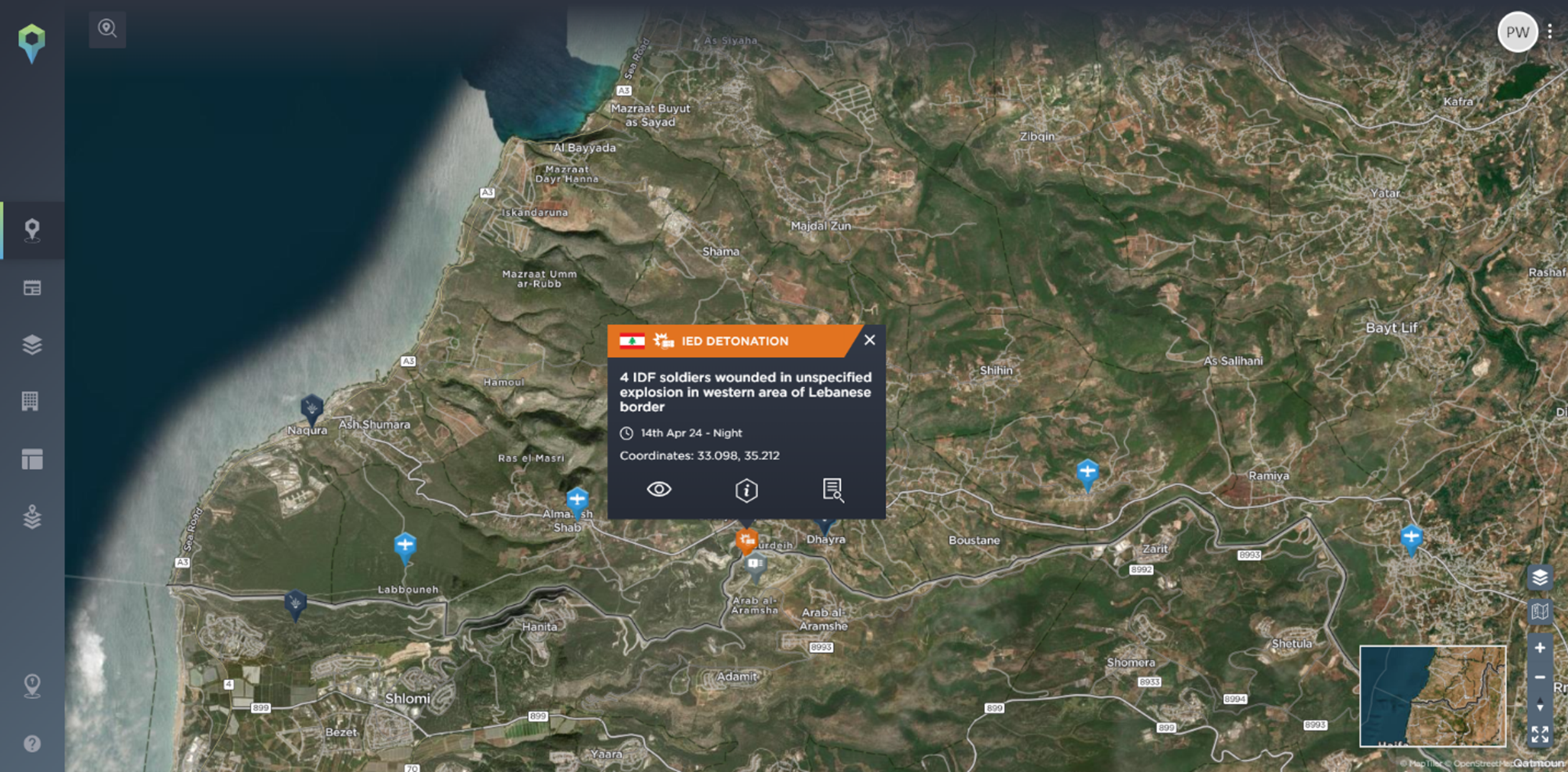
Four IDF soldiers were wounded on 14th April in what may have been a probing operation into Lebanon [image source: Intelligence Fusion]
Despite Israel’s military strength their response could see them overwhelmed if Iran responds to their attack. If there was a second round of hostilities it would likely involve more extensive use of Iranian allies which were largely quiet on the 13th. With the West Bank currently exploding with violence and the Gaza conflict unresolved, Israel could find itself fighting a multifront war that would stretch its capabilities.
Whether Israel decides to attack Iran directly or not, the consequences of its response could be serious. Even if its response is limited, the potential impact of any escalation would be significant. This makes tracking the latest developments from the situation, from sources you can trust, of vital importance.
Intelligence Fusion’s threat intelligence platform is powered by verified, actionable intelligence, with over 1 million historical incidents, and 20,000 new incidents mapped every month – by intelligence analysts trained to military standards. From the October 7 attacks, to Houthi threats to global shipping, our analysts have been closely following the latest escalations in the Israel-Hamas conflict, and keeping our clients informed with accurate, timely intelligence.
If you’d like to learn more about the technology – and the data – that powers our analysis, and how we keep some of the world’s leading organisations informed of the threats to their operations, book some time to speak with a member of our team now.

